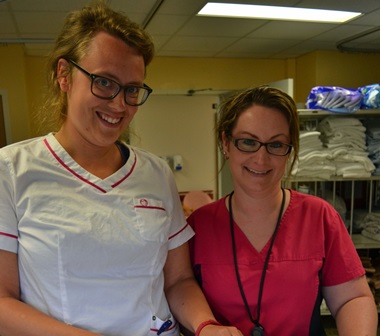It’s a busy night at Campbellford Memorial Hospital and Bachelor of Science in Nursing degree program student Rebecca Butler is gaining some valuable hands on experience caring for patients in the hospital’s special care unit. Butler is in her second last semester as a nursing student at the Trent/Fleming School of Nursing based at Trent University in Peterborough. To gain her degree in Nursing, she must complete a 300 hour placement that gives her, under the guidance of a preceptor, an opportunity to integrate, synthesize and evaluate nursing knowledge and skills in a real setting.
“Mentorship is hugely valuable in nursing and is one of the most important aspects in learning how to be a nurse. Nothing replaces having the ability to ask questions in the moment as things unfold, and having people support me in building my confidence in making decisions and having the confidence to make clinical decisions that are in the best interests of our patients. This is not something you learn reading in a book,” says Rebecca.
MORE: NEXT GENERATION OF DOCTORS PREPARE FOR ‘SILVER TSUNAMI’
Rebecca is particularly appreciative of the investment of time and expertise her preceptor Jennifer Woods, a Registered Nurse at Campbellford Memorial Hospital is making in her future. “The nursing team here works very hard. I am grateful for the time Jennifer and the other nurses are taking to teach me when they already have full schedules. They are helping me to learn so I can be a better nurse,” she says.
Rebecca also values the breadth and depth of experience she is gaining by working in a smaller, team-oriented environment offered by Campbellford, where everyone pitches in to support each other and patients. “There are a lot of benefits of being in a smaller hospital. It is a more personal environment. You get to know people better, do more and see more. People are very welcoming at Campbellford. People seek me out when there is something different happening so I can experience new things. I also appreciate the opportunity to support others and contribute when things get a little crazy,” says Rebecca.
For Jennifer the experience is equally gratifying. “I know how important it is to have a good experience as a student. As a preceptor, we learn a lot about ourselves. We understand what our strengths are and we are also challenged by the questions they ask. I like to teach and help people and this is good exposure for the student. I want this to be a positive experience so they can look forward to their job as a nurse. This is an important placement as it is the last placement on their journey to become an independent nurse. We offer them guidance and support to prepare them to be independent,” explains Jennifer.
MORE: MAKING STAFF WELLNESS A TOP PRIORITY
“I am really proud our nursing team members, like Jennifer, who are taking the extra time and making an effort to give back or ‘pay it forward.’ We are a compassionate profession and it is heartening to see that compassion extend to each other as well as our patients with this kind of partnership and mentoring,” says Jan Raine, Chief Nursing Officer at Campbellford Memorial Hospital.
A small hospital also offers the student a chance to work with a variety of patients. “Here at Campbellford, there are a wide variety of patients including cardiac, post-operative, long-term care and palliative and our students have an opportunity to support them in terms of patient care, providing medication, doing assessments and monitoring their recovery following surgery,” Jennifer says.
“Our partnership with Campbellford Memorial Hospital is one of many we have with hospitals providing clinical experience for nursing students who are required to have a certain number of clinical hours before graduation,” explains Cyndi Gilmer, Assistant Professor at Trent/Fleming School of Nursing.
“These experiences are invaluable for our students. At Campbellford Memorial Hospital, students like Rebecca see the full patient experience and the complete picture of that person under their care. The whole unit typically knows who the patient is – they are a complete person with relationships that extend into the community. Our students get the real flavour of that person behind the paper and diagnosis. For example, what you read about a dying person versus what you experience with a dying person is very different. The lived experience jumps off the page and becomes a real exchange between two human beings – and that kind of experience is invaluable,” she says.
“Preceptors like Jennifer are teaching students to be advocates and leaders and are helping them connect the dots in patient care. We are very fortunate to have senior nurses like Jennifer who are willing to take students like Rebecca under their wing so they can soon fly on their own, ultimately sharing their experience with the next generation of nurses,” says Cyndi.
“This experience has motivated me to be a preceptor in the future and I would definitely recommend a smaller hospital like Campbellford Memorial Hospital for other students looking for a placement,” Rebecca concludes.




